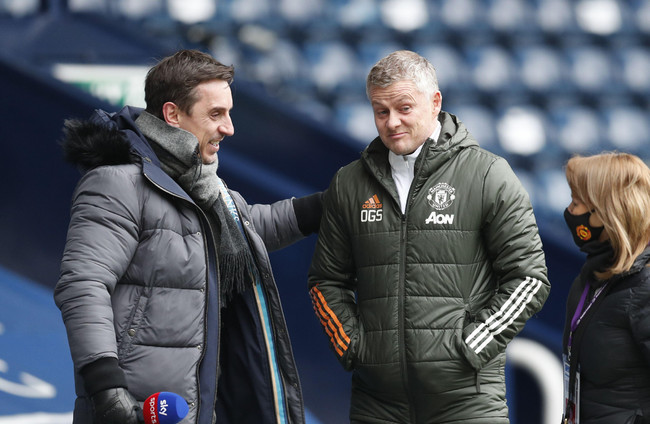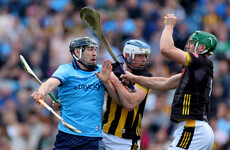AT ITS best, watching live sport can be as enthralling as anything on TV or in movies.
Wednesday’s Champions League clash between Manchester United and Atalanta, for instance, was up there with the best Netflix shows in terms of the drama and entertainment the match provided.
Sometimes, though, the talk around sport can be quite dull.
Any long-suffering journalist is no stranger to the sensation of being trapped in an interview in which the subject is intent on saying nothing of interest.
And that’s bound to happen. In many cases, it is effectively part of athletes’ job requirement to be as uncontroversial as possible. Doing otherwise would be denounced in some quarters as ‘damaging the product’. Media training is essentially an elaborate way of enabling them to disengage from truly meaningful conversations.
And why should sports stars necessarily be expected to say anything especially interesting or inflammatory? Their primary role is to put the ball in the net or cross the try line. If they do that regularly, then nothing else should really matter, or so a certain proportion of people would believe.
Not all athletes follow this rule, of course. Whatever your opinion is of Roy Keane, he is certainly never bland. And there have been plenty of recent cases of athletes defying expectations in this regard too, from Raheem Sterling to Thibaut Courtois.
But what makes these (often justified) outbursts so memorable is that they are incredibly rare. In many instances, a journalist asks a question knowing more or less exactly what the answer will be. And it’s not necessarily bad reporting or poor behaviour from the interviewee — sometimes it is merely the nature of the industry and an inevitable consequence as many sports have become increasingly corporate and lucrative at the top level in recent decades, therefore certain influential people prefer stars to do their talking on the pitch.
Yet when an athlete retires, there is a certain expectation that he or she will become more open with ostensibly less at stake.
In many instances, the stars will effectively become journalists themselves, or ‘pundits’ as they are generally known.
Yet some retired players are better than others at eschewing their inherent diplomacy.
In a long and scathing takedown of tennis legend Tracy Austin’s autobiography, the late novelist and essayist David Foster Wallace wrote: “Obviously, a good commercial memoir’s first loyalty has got to be the reader, the person who’s spending money and time to access the consciousness of someone he wishes to know and will never meet. But none of ‘Beyond Center Court’s’ loyalties are to the reader. The author’s primary allegiance seems to be to her family and friends.”
You could easily extend this criticism to certain members of the football family who are pundits.
Too often, they believe their primary loyalty is to the people on the inside of the sport, rather than the viewers whose hard-earned cash helps to pay their wages.
Yet not every pundit is guilty of this flaw. In his autobiography, ‘A Football Man,’ John Giles wrote about his thinking as he was embarking on a career in punditry.
“If I wanted to get into punditry properly, I would also have to cut any links with the dressing room, so that I wouldn’t be protecting players or managers who are pals of mine,” the ex-Ireland international recalled.
“Even today I can still see the malaise in a lot of television punditry, with ex-players going to great lengths to keep the viewer in the dark about any unique insights they might have.
“Not only are they not doing what they are supposed to be doing, they are doing the direct opposite.”
Regardless of whether or not you agree with all of Giles’ opinions, there is a conviction about what he says that is not a given when it comes to football punditry. For instance, he certainly could not have been accused of going easy on former Leeds United teammate Jack Charlton during the latter’s tenure as Ireland manager and was often critical of the style of football the team employed despite the great success it brought.
And ideally, all pundits should take the same approach of putting themselves at a distance from people directly involved in the game.
Instead these days, the opposite is often the case. Many pundits come across simply as glorified supporters of whatever team they used to represent.
Overly deferential interviews with managers are commonplace.
And even the most esteemed pundits occasionally seem prone to getting swept up in the hysteria that permeates modern football.
It can be seen by Rio Ferdinand joyously proclaiming ‘Ole’s at the wheel’ and feeling the need to get involved in Man United’s recent acquisition of Ronaldo.
Or Gary Neville notoriously asking Ole Gunnar Solskjaer “where would you like the statue” after Man United’s surprise Champions League victory against PSG, which makes for entertaining TV but constitutes the antithesis of journalism.
Of late, as The Guardian’s Barney Ronay alluded to with a tweet that gained considerable traction earlier this week, with Solskjaer and his team struggling to meet expectations, there is a growing sense that many Man United legends are doing viewers a disservice by appearing reluctant to deliver a brutally honest verdict on the Norwegian’s reign.
How can they admit it is simply not working though when people remember questions about statues and the fact that their links to the present regime still appear to be quite intimate in some cases?
As another good football man in Eamon Dunphy might put it, they’ve jumped the fence baby!
Friday
Arsenal v Aston Villa (19.00)
Saturday (games kick off at 3pm unless stated otherwise)
Chelsea v Norwich City (12.30)
Crystal Palace v Newcastle
Everton v Watford
Leeds v Wolves
Southampton v Burnley
Brighton v Man City (17.30)
Sunday
Brentford v Leicester (14.00)
West Ham v Tottenham (14.00)
Man United v Liverpool (16.30)
Bernard Jackman, Murray Kinsella, and Gavan Casey discuss Ireland’s squad, women’s rugby reviews, and the Tadhg Beirne incident on The42 Rugby Weekly:
The42 Rugby Weekly / SoundCloud











Well done Aidan, you and Michaela did your family and Ireland proud.
The last couple of seconds of that video are lovely. All the best now. Unfortunate the ankle stuff, he seems like a good lad.
Great attitude. Fantastic achievement.
That’s nice.
Quality interview by young Aidan Walsh. A little statistic here : Of the 7 boxers this small little country sent we could have had a silver but for injury and we are guaranteed a medal with Kellie me I think it’s going to be gold and the five other boxers who lost 4 of there opponents are guaranteed a medal, it just shows you the class of our boxers with luck we could have won 6 medals Take a huge bow ireland’s boxers and coaches.
While I’m delighted and thrilled with our medals in Tokyo I feel I must raise the issue of RTE pleading the poor mouth and looking for an increase in TV Licence. Its bad enough the wages there top presenters get but they have sent Clare McNamara, Jackie Hurley, David Gillick, Joe Stack, Paul o Flynn, George Hamilton, Greg Allen, Des Cahill to Tokyo i don’t know if the commentators I haven’t mentioned are in a studio in rte commentating or in Tokyo. Then in studio here we have Darragh Moloney and and about 20 other analysts on the programme. The cheek of them to look for an increase in licence fee. There should be only 4 in Tokyo not 8 and and they only need one expert at home per sport and not 2.
@postmanbill:
Then you won’t get these type of interviews… This is a our sporting history and documenting properly once every four years
Yes the people who sent are avid sports fans as well as professionals and I don’t begrudge them enjoying it too
No begrudgery just think there’s to many over there for example you don’t need Jackie Hurley and Claire McNamara basically doing the same job and the same goes for Paul O Flynn and Joe Stack. Maybe I would not be so annoyed if RTE did not come looking for increase in licence every year and for what 75% repeats on there stations. You must be part of the group who have no problem paying for TV licence.